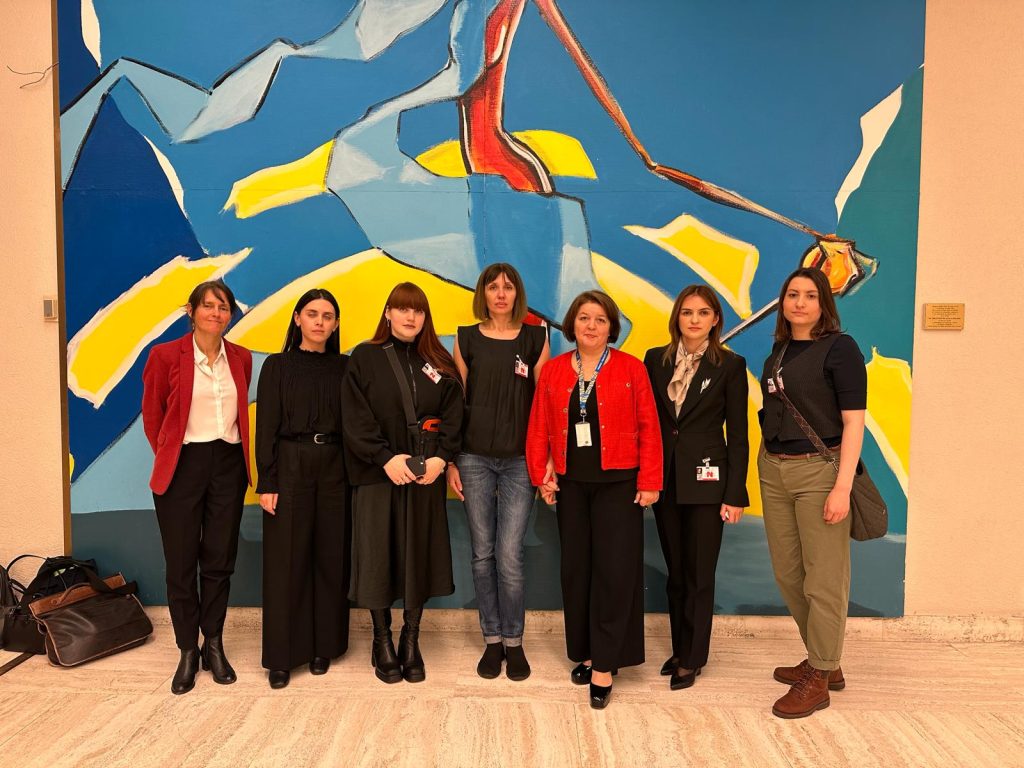The 55th session of the United Nations Human Rights Council (HRC) in Geneva concluded last week. Headed by PHR’s Executive Director Sam Zarifi, JD, LLM, the PHR delegation included Christian De Vos, JD, PhD, director of research and investigations, and Uliana Poltavets, Ukraine emergency response coordinator. The team presented several interventions before the Council, partnered with other NGOs from Ukraine to elevate new research, and met with states about ongoing human rights violations in the Democratic Republic of the Congo (DRC), Ethiopia, Syria, and Ukraine.
Russia’s Rebuke of Human Rights
While the topics of PHR’s advocacy were wide-ranging, this HRC session brought renewed attention to Russia’s role as a perpetrator of human rights violations. This session was the moment for Russia to respond to the Council’s concluding observations of its human rights record as part of the country’s Universal Periodic Review, which concluded in December 2023. Notably, Russia rejected many of the Council’s recommendations, including those concerning the war in Ukraine, which call on Russia to:
- Immediately cease hostilities and comply with its obligations under international humanitarian law;
- Release all Ukrainian civilians deported to and detained in Russia; and
- Cease the forcible transfer and deportation of Ukrainian children to Russia.
These recommendations echoed the concerns raised in our 2023 submission to the Universal Periodic Review (UPR) process with partners, where we highlighted Russian’s attacks on Ukrainian hospitals and health care workers, and the withholding of medical care in Russian-occupied territories. Russia, however, rebuked any efforts at ensuring accountability for crimes in Ukraine by claiming that the UPR recommendations were not “within the purview of the universal periodic review of the Russian Federation and would be rejected.”

Ongoing Attacks on Health in Ukraine
With Russia refusing to address concerns about Ukraine during its UPR, PHR and other advocates applied pressure through alternative means. During the Council’s interactive dialogue with the Commission of Inquiry on Ukraine (COI Ukraine), PHR delivered a statement condemning attacks against health care and energy infrastructure in Ukraine and calling on the Council to ensure accountability for these crimes. The COI published its own report based on evidence of attacks against civilian infrastructure, the illegal transfer of Ukrainian children, and sexual violence in occupied territories.
PHR joined partners to hold a side event titled “Russia’s Abuses Against Civilians in the Occupied Territories of Ukraine.” During the event, PHR presented its latest findings on attacks on health in Ukraine as well as the use of unlawful detention, torture, and withholding of medical care to non-Russians (“passportization”) to suppress resistance and instill fear. As described by Uliana Poltavets, “collectively, these incidents suggest an apparent pattern of conduct by Russia that both limits and violates civilians’ right to health and use health care as a tool to control and intimidate civilians.” The Office of the High Commissioner for Human Rights issued a report that similarly found evidence of torture and discrimination in access to health care, leading to a “climate of fear” in the occupied territories of Ukraine.
More than 13 Years of Conflict in Syria
Last month marked 13 years since the start of the Syrian uprising and subsequent violent reprisals by the Assad regime, supported by the Russian Federation. According to PHR’s investigations, at least 400 medical facilities have been targeted in Syria at least 604 times. More than 949 health care providers have been killed, with the vast majority of these crimes perpetrated by the Syrian government or the Russian forces. Additionally, 1,100 health care providers who were detained in 2011 and 2012 are still among the countless missing and disappeared. We shared these findings before the Human Rights Council during the interactive dialogue with the Commission of Inquiry on Syria.
PHR focused its advocacy at the HRC to promote accountability for missing and disappeared persons in Syria, particularly health care providers. In meetings with States, we shared evidence from our 2021 and 2022 reports about detained, tortured, and missing health care workers, and urged diplomatic missions to fully fund and support the new Independent Institution on Missing Persons in Syria, established late last year by the UN General Assembly. We also drew attention to the forthcoming case against a former Brigadier-General in the Syrian army accused of committing war crimes, including the indiscriminate targeting of civilian infrastructures in areas within Syria, which is being heard in Sweden after years of sustained civil society advocacy.
Keeping the Council’s Attention on the DRC and Ethiopia
Ongoing conflict-related sexual violence in other conflict settings, including Ethiopia and the DRC, also demand accountability, a point PHR also raised in its oral interventions. Yet, there has been a failure by the international community, including the Council, to take meaningful steps to address these crises.
During discussions on Ethiopia at the previous HRC session in late 2023, States allowed the mandate of the Independent Commission of Human Rights Experts on Ethiopia (ICHREE) – the sole international and independent monitoring body for the conflict – to expire. Contrary to assertions made by Ethiopia, violence has continued since the Cessation of Hostilities Agreement, especially in Tigray, with widespread impunity. At this session, PHR underscored the importance of accountability for sexual violence in Tigray particularly as conflict escalates in other parts of the country, asked that Ethiopia be returned to the Council’s official agenda, and reiterated the need for a new independent oversight mechanism.
PHR also made an oral intervention on the situation in the DRC to highlight the staggering number of cases of sexual and gender-based violence in the eastern region of the country. The current conflict risks escalating into a humanitarian crisis, with over 6.9 million internally displaced people and 90,000 reported cases of sexual violence in 2023 alone. Particularly given the upcoming withdrawal of MONUSCO, PHR called on the Council to take urgent steps to empower and support documentation and accountability for grave human rights abuses.
Looking Ahead
Ongoing crises, such as those in Ethiopia, DRC, Ukraine and Syria require further attention by the Human Rights Council in the year ahead. It is urgent that the Council acts to mobilize resources and concrete interventions to strengthen prevention, impartial investigation, accountability, and justice for survivors.
The Council can do this by following up on the important resolutions passed this session. For example, States passed a resolution that extends the mandate of the Commission of Inquiry on Ukraine, calls on Russia to withdraw from Ukraine, and condemns ongoing human rights violations.
The Council must also respond to the humanitarian crisis in the Occupied Palestinian Territory, which was addressed this session. The Council overwhelmingly passed the Resolution “Human rights situation in the occupied Palestinian territory, including East Jerusalem, and the obligation to ensure accountability and justice,” which demands that Israel lift its blockade on the Gaza strip to allow for immediate emergency humanitarian access, calls for an immediate ceasefire, and urges states to cease the sale, transfer and diversion of military equipment to Israel, among other asks. The call for a humanitarian ceasefire echoes that made by the Security Council on March 25, but unlike the Security Council, is not legally binding.
Photo (top) from left to right: Saman Zia-Zarifi, JD, LLM, executive director; Christian De Vos, JD, PhD, director of research and investigations; Uliana Poltavets, Ukraine emergency coordinator.

